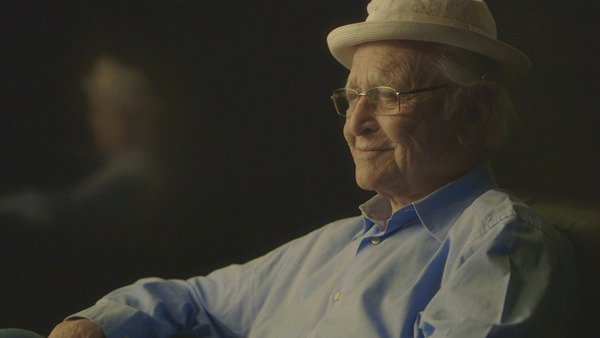A case could be made that Norman Lear is the most important, prolific communicator in modern American history. At his peak as a writer and producer of TV sitcoms in the 1970s, his weekly total viewership tallied some 120 million Americans, with All in the Family, The Jeffersons, Good Times, and more on the air. One abortion-centric episode of Maude, for instance, drew an estimated audience of 65 million (along with reportedly 17,000 indignant letters). But the most impressive thing about Lear’s output during this stretch is that these were not Chuck Lorre-esque sex farces but works of genuine social, political, and cultural relevance. The new documentary Norman Lear: Just Another Version of You is a charming tour of the dizzying output of this still-spry 93-year-old creator, as well as a surprisingly piercing probe into his psyche.
The documentary offers up copious behind-the-scenes footage of Lear and his colleagues racing around the offices when his shows were in production, including true rarities, such as table reads for Good Times episodes, where star Esther Rolle alternates between appreciating the script and firmly challenging its authenticity. A recent ceremony where Lear received the PEN Lifetime Achievement Award bookends the film. There we see Lear bask in the adoration of today’s TV elite like Amy Poehler and Jon Stewart. To his credit, even in his very advanced age, Lear has remained hip enough to recognize the great contributions Poehler and Stewart have made to the medium he pioneered.
There aren’t as many commentators remarking on his career and life as one might’ve expected, since Lear does most of the talking, though the talking heads featured—George Clooney and John Amos—are insightful and eloquent. As Clooney rightly notes, the cultural revolution of the late 1960s hadn’t really made it onto mainstream television until Archie Bunker and his hirsute son-in-law began butting heads.
It’s easy to forget what a novel, controversial show All in the Family was when it premiered, having been so long ensconced in the pantheon of revered TV sitcoms. Before that show came along, primetime TV was largely awash in buffoonish distractions (The Flying Nun). Prior to All in the Family’s initial airing, a disclaimer informed viewers that what they were about to see was satire, intended to shed light on our follies and frailties by grappling directly and boldly with them. As Lear himself says of his show’s originality, “What was new was that we were engaging with reality.” And this was a type of reality not of today’s Kardashian or Bachelorette strains.
The show engaged with the more unpleasant aspects of everyday life so deeply that much of its language would not be allowed on network television today. One may look at this exclusion of incendiary language from our public airwaves as progress, but one may equally look at it as a regressive failure to confront issues head-on. Refusing to allow hateful ideas to be expressed does not eradicate them but makes them fester. Instead of running from challenging, “triggering” language as we do today, that sitcom rubbed your face in it, forcing you to grapple with the ugly truths that millions of Americans secretly, or not so secretly, harbored. Considering the ongoing menacing influence of slogans like “Make America Great Again,” a satire skillfully lampooning a bloated blowhard who sings “Those Were the Days” could not be more prescient and more necessary today.
All in the Family was a genuine attempt by progressives like Lear and even Archie Bunker himself, actor Carol O’Connor, to understand a bigot, but just as importantly, it was riotously funny. As Poehler aptly notes when introducing Lear at the PEN ceremony, making people laugh while dealing with complex ideas is so hard that no one even tries to do it anymore.
There is probably enough to discuss regarding that one show for a whole documentary, but this film treats it more as one job in Lear’s long, busy life. We learn about Norman Lear the man and that, perhaps unsurprisingly, he was an incorrigible workaholic. As he puts it, he had five families on TV and one family in real life, and he reasoned that his TV families couldn’t take one breath without his total involvement while his real-life family could get on without him well enough. In a memorable clip, journalist Mike Wallace asks Lear, whose sitcoms at one point constituted half of the 10 most watched programs, why he produced so much TV. Lear’s incredulous, flabbergasted, uncomprehending reaction speaks volumes—it had simply never occurred to him not to make as many shows as was humanly possible, consequences to his family or mental health be damned.
To his credit, Lear has never stopped trying to improve himself, and he chose to begin psychotherapy in his mid-80s. We see him gamely confront deep psychological traumas, dealing with his unprocessed thoughts about his father. It’s an inspiring testament that it is never too late to improve mental health. About as open and probing as a documentary gets, Norman Lear: Just Another Version of You is a revealing look at an unparalleled entertainer’s professional and personal life.

















Leave A Comment